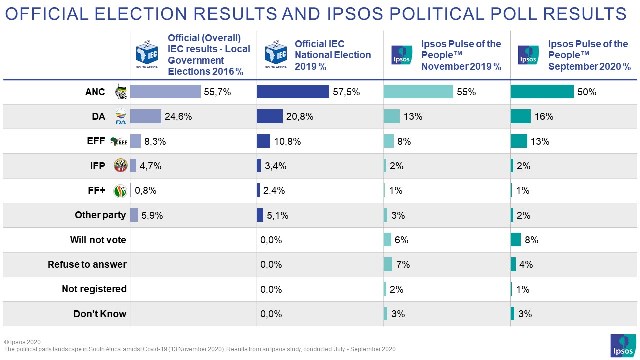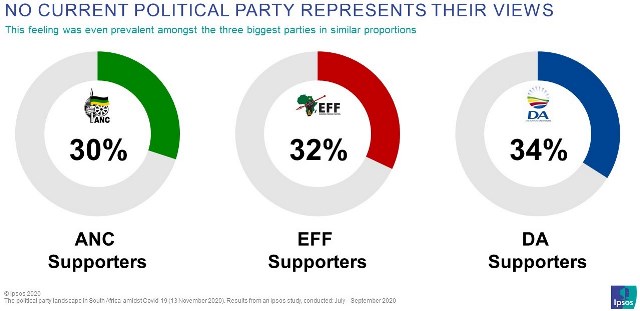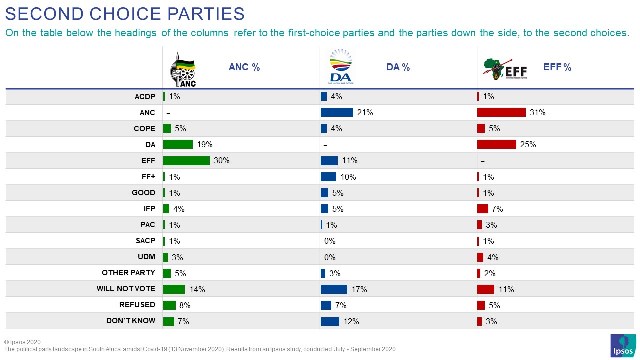The political party landscape in South Africa amidst Covid-19
Political choices are relatively stable despite seven months of Covid-19 lockdown rules
13 November 2020
This past Wednesday was called “Super Wednesday” in South Africa, as citizens in 95 wards across 55 municipalities went to the polls to elect new councillors. Due to Covid-19 the IEC organised all the by-elections that were due in municipalities to happen on the same day, and altogether 44 candidates from 40 political parties participated.
At the time of writing, all results are not published yet and although these by-elections might be an indication of how the political wind blows currently, it will probably not be a strong indication of things to come in next year’s scheduled Local Government Elections.
Another view of the current opinions in the country can be found in an Ipsos poll conducted during July through to September 2020, using face-to-face and telephone interviewing methodologies (as allowed by the lockdown regulations). A total of 3,758 interviews were conducted with randomly selected South Africans, 18 years and older. The results of the study are representative of the views of South Africans of voting age.
Current political party choices
Respondents were asked which political party they would vote for if there were an election the next day - and they had a free choice to choose any political party. Half (50%) chose the ANC as their party of choice – a drop of 5 percentage points since the previous Ipsos Pulse of the People™ survey in November 2019. On the other hand, it seems as if support for both the DA and EFF slightly increased from November 2019.
It appears as if the DA, a party which faced a turbulent few months since the 2019 National Election, might slowly be recovering lost ground, while the EFF is building on their successes of the 2019 National Election.
For all three the biggest political parties in the country, the results from the next few Ipsos Pulse of the People™ studies, planned for the months before the next Local Government Elections, will be very interesting.1

- Despite the existence of a plethora of parties in the country, still only 5 parties registered support of at least 1% on the National - ---- Ballot in the Ipsos Pulse of the People™ studies and are thus included in the table above.
- In the IEC-administered elections many more parties received votes, but they are not included in the table above.
- It has to be kept in mind that the results of the Ipsos Pulse of the People™ studies shown above are representative of all South Africans, 18 years and older, i.e. those eligible to vote. The election results refer to the actual elections and therefore show only the opinions of those voters who have turned out to cast their votes in the particular referenced elections.
Volatile trust in political parties and questions about the direction of the country
2020 is by no means an easy year for most South Africans and about four in every ten (41%) said that the country was currently going in the wrong direction. Although this feeling that the country is going in the wrong direction is not as strong as it was during the last few years of the Zuma presidency, it is still not a positive finding.
Although ANC-supporters are a bit more optimistic than the supporters of the DA and the EFF, only about a third of them (37%) said that they thought South Africa was going in the right direction. More than half of the supporters of the DA and the EFF respectively feel that the country is going in the wrong direction.
It is not that South Africa is home to an overwhelming number of pessimists, but almost three in every ten are either saying that they do not know what to think about the direction of the country or that they are undecided about the question.

To add to the feelings of uncertainty, a third of South Africans (34%) felt that no single political party represented their views. This feeling was even prevalent amongst the three biggest parties in similar proportions, with the supporters of these parties indicating that they “Strongly Agree” or “Agree” that no current political party represented their views.2

Consequently, it should be no surprise that the level of trust expressed in political parties were quite low. This “trust score” was calculated by subtracting the proportion of those with negative trust in the party from the proportion of those who expressed positive trust in the party. From the table below, only the ANC currently has a quite low positive trust score, while the other two parties are showing a negative trust score.

Trust in political parties might be a key motivating factor in next year’s Local Government Elections, influencing the decision to decide to vote for a particular political party, but also influencing the decision on whether to vote at all. We have seen the number of voters who turn out to vote dwindle over the last few elections. This might have an influence on the legitimacy of the elections and opinions about whether the elections are free and fair, and expressing the will of the people.
Theoretical second choices
To give some perspectives on these issues, respondents were also asked to indicate which party they would vote for as a SECOND choice if their first-choice party were not available for whichever reason.
(This will not happen in an election, as a voter will not be offered a second choice.)
Three out of every ten ANC supporters (30%) indicated that their second choice will be the EFF and almost two out of every ten (19%) chose the DA as a second choice. A quarter of the EFF supporters chose the DA as a second choice, while only 11% of DA supporters chose the EFF as a second choice. The ANC was the second choice for 31% of EFF supporters and 21% of DA supporters.

It is clear that all political parties have their work cut out for them before the Local Government Elections – eligible voters are uncertain, and party loyalty is relatively fluid.
Technical Detail:
Fieldwork: July – September 2020
3,758 in-home face-to-face (CAPI) and telephonic (CATI) interviews. Conducted in preferred home languages of randomly selected respondents
Countrywide representation
Results filtered by those 18 years old and older
Results weighted and projected to the official South African population figures for this universe
Margin of error for this sample as a whole is a maximum of 0.65 – influenced by sample size, response rate and sampling methodology employed
Footnotes:
1 To keep perspective, official IEC results from the 2016 Local Government Elections and the 2019 National Election are added to the table.
2 The question about party choice asked respondents to indicate which party they would vote for if there were an election the next day. Clearly all those that chose a certain political party are not necessarily devoted to that party.
Issued by Ipsos South Africa, 13 November 2020

